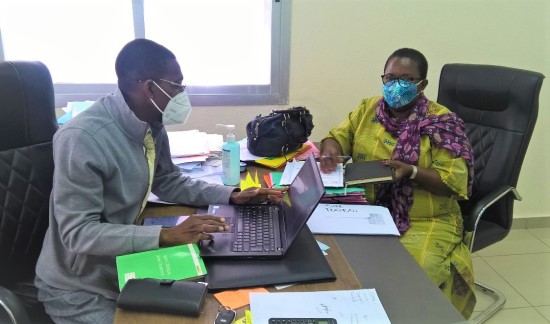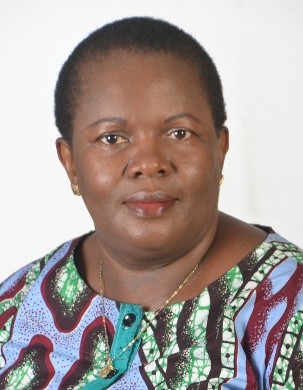
13 Jul Three Questions with COVID-19 Coordinator Dr. Monique N’Guessan: Charting a course for Côte d’Ivoire
 Dr. Monique N’Guessan is a veterinary doctor and public health expert, specializing in veterinary health emergency and crisis management. She has more than 25 years of experience working in the animal health sector and in the management of animal health projects in Côte d’Ivoire.
Dr. Monique N’Guessan is a veterinary doctor and public health expert, specializing in veterinary health emergency and crisis management. She has more than 25 years of experience working in the animal health sector and in the management of animal health projects in Côte d’Ivoire.
Question 1: Paint a picture for us. How is the COVID-19 pandemic playing out in Côte d’Ivoire at the moment?
COVID-19 was first diagnosed in Côte d’Ivoire on March 12 and the situation has been constantly evolving. As of July 3, 2020, the country had registered 10,244 confirmed cases, with 5,448 active cases, 4,726 survivors, and 70 deceased. The current situation is very worrying because there has been a shift from imported cases—meaning those ill with COVID came to Côte d’Ivoire from other places—to community transmission—so it is now spreading locally, despite the measures taken by the government to control the pandemic.
In response, the government of Côte d’Ivoire created an operational monitoring committee for the fight against COVID-19 known as CSO-COVID-19. The committee is made up of nine sectoral operational coordination units and key actors. Working with USAID technical implementing partners, CSO-COVID-19 organizes and synthesizes a range of essential community services including testing, containment and epidemiological surveillance, medical care, hygiene, health security, burials, and pharmaceutical stock management and distribution.
CSO-COVID-19 has taken several measures to raise awareness and disseminate information on preventive measures, systematic detection of suspicious cases with quarantine or containment, and management of confirmed cases. They have also ensured:
- Both public and private laboratories are permitted to process samples for COVID-19 diagnosis to support the already-existing reference laboratory (Institut Pasteur de Côte d’Ivoire)
- The opening of COVID-19 screening centers including 13 screening centers for each of the communities in greater Abidjan and also centers for the management of COVID-19 cases so they are as close as possible to hotspots or virus clusters (95 percent of COVID-19 cases are concentrated in the district of Abidjan)
- An increase the number of COVID-19 beds in public and private facilities for the treatment of severe or complicated cases
- Set up of rapid intervention teams (RITs) to follow up suspicious cases at home
- Set up of tracer teams to search for contacts of contaminated persons
Despite these efforts and safety measures—wearing of masks in public places, hand washing several times a day, social distancing, and the isolation of greater Abidjan—the number of cases is increasing daily. Currently, protective measures are unfortunately not often being followed by most citizens.
In the context of this health crisis, health personnel are encountering difficulties. In normal times, Côte d’Ivoire suffers from a deficit of health workers (in 2014, the World Bank estimated 20 physicians per 100,000 people) and in the management of a pandemic, the gap widens. Health workers also lack protective equipment. Overall resuscitation capacity is very weak in public and private health facilities across the country. Our efforts thus far have not been sufficient in view of the constantly increasing number of cases.
Question 2: What are some activities HRH2030 is undertaking to strengthen the country’s health system in the fight against COVID-19?
HRH2030 is supporting Côte d’Ivoire by strengthening human resources for health, coordinating the various committees involved in the management of the health crisis, and also in raising awareness about the disease and prevention measures amongst veterinary professionals and students engaged in One Health Clubs at their universities.
The project activities will make it possible to support:
- Monthly meetings for the evaluation of pandemic management activities, to identify the strengths and weaknesses of the COVID-19 response and propose management improvements at the level of the Public Health Emergency Operations Center (Centre d’opérations d’urgence en santé publique or COUSP)
- The establishment of a network of public and private laboratories for COVID-19 diagnosis by working with the Institut Pasteur de Côte d’Ivoire (IPCI) to harmonize processes and procedures—from receiving samples to reporting results—in order to systematically detect suspect cases and meet the country’s needs
- The validation of documents developed regarding infection prevention and control (IPC), including the triage form; the investigation form for a COVID infection in a health professional; the scopes of work for focal points with IPC and the hygiene committee; and the standard operating procedures developed by the COVID-19 IPC task force
- The provision of computer equipment for a surveillance system to enable the availability and accessibility of surveillance data
- Awareness building among health workers, veterinarians, students, communities, and multi-sector health professionals—on the epidemiology of COVID-19, prevention measures, and how to communicate out about the disease—to increase understanding of the importance of respecting and implementing protective measures against COVID-19.
Question 3: How do you foresee Côte d’Ivoire’s health system will be changed in the years ahead because of this pandemic?
Throughout this crisis, the health system has been experiencing significant challenges, especially in terms of coordination, and the inadequacies of various sectors of the health system are being exposed.
The support provided by HRH2030 will be useful in three key ways: harmonizing management procedures between laboratories; promoting teamwork and the implementation of the One Health platform with effective collaboration between its members and the COUSP at the National Institute of Public Hygiene (Institut National D’hygiene Publique INHP) level for the management of future infections; and strengthening the role of the IPC committee to synchronize field interventions and increase the availability of data to inform decision-making.
More generally speaking, in the field at COVID-19 centers for case management, IT tools have become essential with georeferenced applications and data for monitoring cases. It is my hope that the use and integration of technology will become widespread to continue supporting our health system after the pandemic, so that we may continue to have available and reliable data for the prevention and control of emerging diseases.
In terms of coordination between the various health structures (diagnostic laboratory, patient care, and epidemiological monitoring), many shortcomings have been highlighted in the management of the health crisis, so I hope that those responsible for these structures will seek to meet the challenges head-on and work to remedy the deficiencies with support from partners.
Photo: COVID-19 coordinator Dr. Monique N’Guessan (right) is pictured working with COUSP manager Dr. Djebril Cherif.





